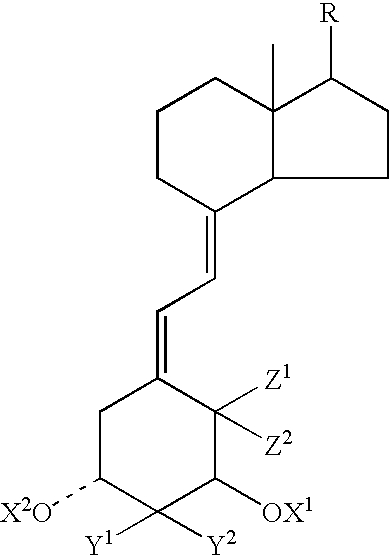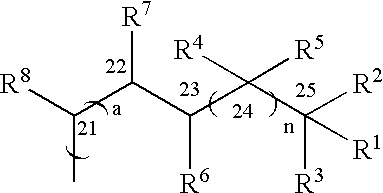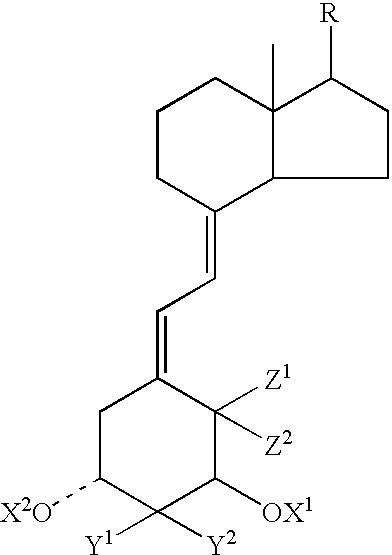Use of biologically active vitamin D compounds for the prevention and treatment of inflammatory bowel disease
a technology of biologically active vitamin d compounds and ibd, which is applied in the direction of biocide, organic chemistry, drug compositions, etc., can solve the problems of ibd without known cure, afflict 2 million people, and current methods of managing ibd symptoms cost an estimated $1.2 billion annually in the united states, so as to delay the onset of symptoms
- Summary
- Abstract
- Description
- Claims
- Application Information
AI Technical Summary
Benefits of technology
Problems solved by technology
Method used
Image
Examples
example 1
Calcitriol Inhibition of IBD Induction
[0098] This Example describes the inhibition of IBD induction in mice with calcitriol. Two types of mouse models are utilized. The fist group is the widely used DS-induced murine model, which reflects the involvement of enteric microbes, innate immunity, and non-specific inflammation in IBD. Mouse strains vary in their susceptibility to DS-induced IBD [Mahler et al., Am. J. Physiol.--Gastro. & Liver Physiol., 37 G: 544-G 551, (1998)], so the highly susceptible strains C3H / HeJ and C57BL / 6J are employed. The second group of IBD models involves mice with targeted disruptions in immunologically relevant genes. In particular, the widely used IL-10 knockout on the C57BL / 6J background is employed (i.e. C57BL / 6J-IL-10 ko). An alternative to these C57BL / 6J-IL-10 ko mice (not described in this Experiment), are mice with a homozygous IL-10 ko mutation on the mixed 129 / Ola.times.C57BL / 6 genetic background. These two groups of mice are employed as described ...
example 2
Analysis of Samples from Treated Mice
[0103] This Example describes the analysis of stool, serum, and colon samples from both groups of mice described in Example 1. Stool extracts are analyzed individually for protein, hemoglobin, and lactoferrin. Serum samples are analyzed for Ca, IFN-.gamma., and TGF-.beta.1. Colon samples are analyzed individually for myeloperoxidase (5 / group), IFN-.gamma. and TGF-.beta.1 immunohistochemistry, and for histopathology (5 / group). Fecal extracts and intestinal tissue extracts are assayed for protein content by a micro-Bradford assay [Bradford, M. M., Anal. Biochem., 72:248-254 (1976)]. Results of the hemoglobin, lactoferrin, and myeloperoxidase assays are then determined per mg of protein in the sample. Fecal hemoglobin and fecal lactoferrin (as well as weight) are plotted as a function of time. Histopathology scores for disease incidence and severity, myeloperoxidase activity, and IFN-.gamma. and TGF-.beta.1 values are tabulated, and differences betw...
example 3
Treating Established IBD in Mice
[0117] This example describes the treatment of established IBD in mice using calcitriol. The procedure is the same as Example 1 above, except treatment is not started until the mice show signs of IBD. This is accomplished by administering DS in the drinking water of the mice listed in groups 1-4 in Table 1, followed by acidified water without DS thereafter. The mice are also weighed at the beginning of this procedure. At two-day intervals, stool samples are tested as in Example 1 for hemoglobin and lactoferrin. Treatment with calcitriol is begun when these test indicate the mice are suffering from IBD.
[0118] Thereafter, weights and stool samples are obtained at 4-day intervals. On day 22, the mice are weighed, euthanized, and stool, blood, and colon samples are collected. Stool extracts, blood, serum, and colon samples are analyzed as described in above in Example 2. Weight, fecal and blood hemoglobin, and fecal lactoferrin are plotted as a function o...
PUM
| Property | Measurement | Unit |
|---|---|---|
| pH | aaaaa | aaaaa |
| pH | aaaaa | aaaaa |
| weight loss | aaaaa | aaaaa |
Abstract
Description
Claims
Application Information
 Login to View More
Login to View More - R&D
- Intellectual Property
- Life Sciences
- Materials
- Tech Scout
- Unparalleled Data Quality
- Higher Quality Content
- 60% Fewer Hallucinations
Browse by: Latest US Patents, China's latest patents, Technical Efficacy Thesaurus, Application Domain, Technology Topic, Popular Technical Reports.
© 2025 PatSnap. All rights reserved.Legal|Privacy policy|Modern Slavery Act Transparency Statement|Sitemap|About US| Contact US: help@patsnap.com



